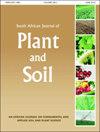南非灌溉农业节水的挑战与机遇
IF 0.7
Q3 AGRONOMY
引用次数: 1
摘要
这篇综述简要概述了由于气候变化而变得更加明显的灌溉农业问题。在南非的大多数灌溉地区,对水的需求超过了供应,因为大多数集水区的地表水资源已经完全或超额分配。在区域范围内,供水商应努力以最佳方式管理分配给农民的水量和水质,同时为农民提供最新的水量和质量信息,以供规划和管理之用。最近南非大部分地区的长期干旱迫使用水者重新审视其农业系统的效率。在农场规模上,需要通过有效的灌溉计划和在合适的土壤上实施适当的灌溉技术来实现高效灌溉。土壤信息和土地管理的重要性经常被低估,但这些是成功的保护性农业的关键因素。农民应测量灌溉量和需求,以及灌溉期间的灌溉和土壤水质。基础设施改革的高成本是农民提高效率的主要障碍,而缺乏蓄水坝和灌溉计划中的水分配方式也阻碍了农民提高效率。本文章由计算机程序翻译,如有差异,请以英文原文为准。
Challenges and opportunities for water conservation in irrigated agriculture in South Africa
This review provides a brief overview of problems in irrigated agriculture that have become more evident as a result of climate change. In most irrigated regions in South Africa, the demand for water is exceeding the supply, as surface water resources in most catchments are already fully or over-allocated. In a regional context, water suppliers should strive to optimally manage the quantity and quality of water distributed to farmers, while providing farmers with up-to-date water quantity and quality information for planning and management purposes. Recent prolonged droughts across most of South Africa have forced water users to review the efficiency of their farming systems. At the farm-scale, efficient irrigation is required by means of effective irrigation scheduling and implementation of appropriate irrigation technologies on suitable soils. The importance of soils information and land management is often underestimated, but these are key elements to successful conservation farming. Farmers should measure irrigation volume and demand, as well as irrigation and soil water quality during irrigation. The high cost of infrastructure changes is a major barrier to farmers becoming more efficient, while a lack of storage dams and the way that water is distributed in irrigation schemes also prevent farmers from being more efficient.
求助全文
通过发布文献求助,成功后即可免费获取论文全文。
去求助
来源期刊

South African Journal of Plant and Soil
Agricultural and Biological Sciences-Plant Science
CiteScore
1.90
自引率
11.10%
发文量
32
期刊介绍:
The Journal has a proud history of publishing quality papers in the fields of applied plant and soil sciences and has, since its inception, recorded a vast body of scientific information with particular reference to South Africa.
 求助内容:
求助内容: 应助结果提醒方式:
应助结果提醒方式:


